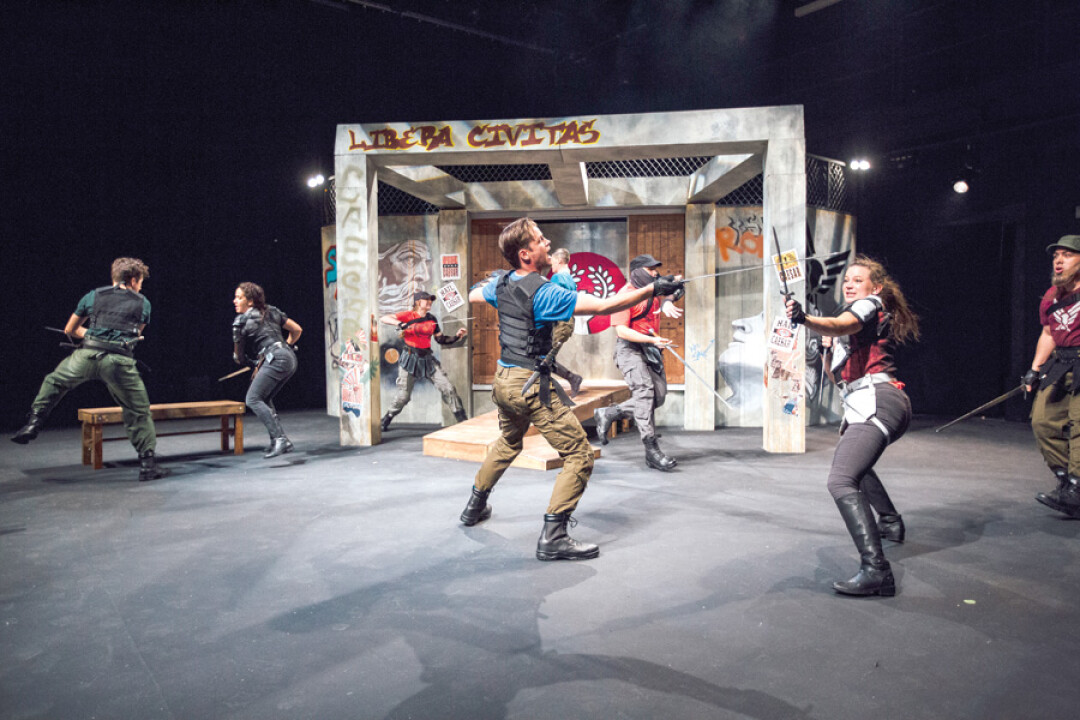Let Slip the Dogs of War
Julius Caesar at the Ellen
Kevin Brustuen | Thursday Nov. 1st, 2018

"Beware the Ides of March!” Thus spoke the soothsayer to Julius Caesar a few days before he was murdered on March 15, 44 B.C. Shakespeare in the Schools now brings the history and the tragedy of Julius Caesar back to life for a brief moment this fall in their tour of high schools across Montana and Wyoming, and to the public at the Ellen Theater in Bozeman on November 10. While this tour is designed specifically for high school students, this is an opportunity for the general public to see a stunning performance of a powerful play by one of the world’s greatest playwrights.
Julius Caesar, a tragedy about the assassination of Julius Caesar and the resulting chaos that followed, was written by William Shakespeare in 1599. William Shakespeare’s play is the main source of knowledge about Julius Caesar and the ancient Roman Empire for most of us. The tragedy of Julius Caesar speaks of fate and free will, ambition, power, and loyalty. It’s a fitting play for our time and for the educational outreach brought to us by Montana Shakespeare in the Parks.
Since 1973, Montana Shakespeare in the Parks (MSIP) has been bringing theater to audiences in Montana, Wyoming, Idaho, Washington, and North Dakota through summer outdoor shows. In 1993, MSIP Artistic Director Joel Jahnke established Shakespeare in the Schools as another annual outreach program for high schools and middle schools across Montana.
This year’s Shakespeare in the Schools tour is Julius Caesar, the second time Shakespeare in the Schools has performed this play in Montana middle and high schools. Current Artistic Director Kevin Asselin played the role of Brutus in the previous production in 2002. If Julius Caesar is performed in its entirety, as Shakespeare wrote it, the play would take 2.5 hours to perform and include a cast of 34 characters. In preparing for this season, Asselin cut the script down to 80 minutes and eight actors to better accommodate school schedules and allow time for the actors to engage the students in educational workshops. Doing so, Asselin had to keep the essence of the play intact, while still allowing time for the actors to build the rapport necessary to carry the plot successfully through to the end. Hence, Brutus has to be shown as close to Caesar; Antony has to be shown as devoted to Caesar; Caesar has to be shown as likeable and loved by the masses. Yet the conspirators have to be shown to have reasons why they feel it necessary to assassinate Caesar. It is a daunting task to trim a script by that much and still tell the story, but Asselin succeeded and this production provides a powerful, moving, poignant, and thought-provoking performance.
As Asselin worked out the cut of the script, he kept in mind the primary audience and developed a concept for this production of Julius Caesar that could resonate with high school kids, part of Generation Z, familiar with retrofuturism styles. The set invokes thoughts of inner-city decay and by-gone glories. The graffiti painted on the walls suggests the sides of railroad cars, boxcar art, words and symbols emblazoned on the sides of moving ‘billboards’ for all the world to see, in Banksy-style, clearly a common sight in inner cities world-wide, a touch of our modern world. Yet, the more you look at this set, the more you realize the graffiti, signs, paintings, and posters are superimposed onto an ancient Roman structure, creating the sense of crossing time boundaries.
The plot of Julius Caesar includes scheming, conspiracy, murder, suicide, and the assassination of Caesar, the dictator of Rome. The play examines the motives and ambitions of the powerful and those who surround power; it makes one consider the power of fate versus free will. Asselin cut the script in a way that brings focus on Brutus and Mark Antony, two of Caesar’s closest friends and supporters, one of whom chooses to join the conspirators, the other to support Caesar. Scenes of mobs and the ease with which Antony and Brutus manipulate the crowds can suggest parallels to current affairs.
The Romans in this production wear piercings reminiscent of modern grunge, tunics and cloaks similar to those of ancient Rome, armor from the middle ages, and wave ancient daggers and swords against a backdrop of a mixed ancient-new world. The costumes, the accouterments, the piercings, the hairstyles, along with the set itself, combine to create a performance that evokes a sense of “timeless presence,” a mixing of the ages, an impression that this tragedy can’t be consigned to the dust bin of the history from which the story originates, but that these themes are relevant today.
This production casts female actors in traditional male roles such as Mark Antony, Casca, and Octavian. The practice of gender-blind casting popular with Shakespearean companies around the world gives these actors the opportunity to play these complex and large roles that have historically been limited to men.
Educators Stephanie Chavala and Bobbie Mckean created an education curriculum that the actors use in their workshops with students. After introducing the material to the company, Stephanie and Bobbie worked with the actors, training them to work with high school students. These workshops use themes brought out in the play to encourage students to explore and discuss them on a more personal level. Common themes that come up in high schools watching Julius Caesar include governance, bullying, peer pressure, suicide, and ethics. Beginning in early October and culminating in mid-December, the tour takes the actors and Shakespeare in the Parks to all corners of Montana, covering a wide range of conditions: rich and poor, privileged and disadvantaged, rural and urban. But the one thing all have in common is the presence of teenagers for whom an exciting performance of a Shakespearean play could make a lasting impact.
While the fall tour of Shakespeare in the Schools’ production of Julius Caesar is designed for high schools, the play is provocative and entertaining for all audiences. The Ellen performance for the general public is an opportunity to see this stirring and deeply moving production. For only the second time, Shakespeare in the Schools’ fall production is available for the public to see it, as they bring Julius Caesar to the Ellen Theater on November 10th at 7:00 pm. There is no admission charge: it’s a free production and seating is on a first-come basis.
For more information, go to https://shakespeareintheparks.org/education/shakespeare-in-the-schools
| Tweet |
